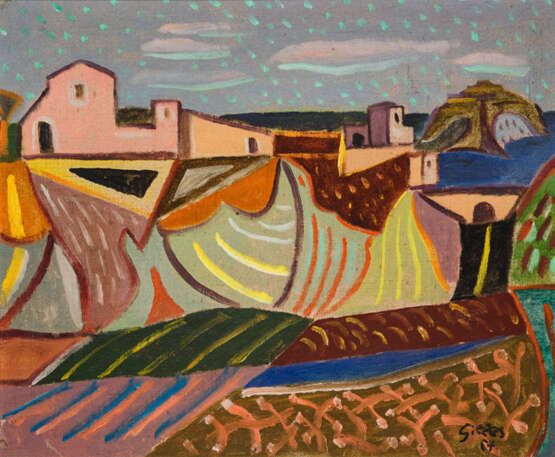ID 68978
Lot 1074 | Gilles, Werner (Rheydt, 1894 - Essen, 1961)
Provenienz: Privatbesitz, Baden-Württemberg. - Der 1883 in Döbeln geborene Erich Heckel bildete sich als Autodidakt zum Maler und Grafiker aus. Im Juni 1905 gründete er mit Ernst Ludwig Kirchner, Karl Schmidt-Rottluff und Fritz Bleyl in Dresden die Künstlergruppe 'Brücke' , zu der später noch Max Pechstein, Emil Nolde und Otto Mueller hinzustoßen sollten. Von 1907 bis 1910 hielt er sich lange mit Schmidt-Rottluff in Dangast an der Nordsee auf, 1909 reiste er nach Italien. In Dresden ging Heckel zeitweise eine enge Ateliergemeinschaft mit Kirchner ein. Zwischen 1909 und 1911 verbrachte er dann auch zusammen mit Kirchner und gelegentlich auch mit Pechstein den Sommer an den Moritzburger Teichen bei Dresden. - Im Herbst 1911 zog es Erich Heckel nach Berlin, wo sich die moderne Kunst in Deutschland konzentrierte und die entscheidenden Richtungskämpfe ausgetragen wurden, aus denen der Expressionismus als Sieger hervorging. In Berlin lernte er schließlich auch andere Künstler wie Lyonel Feininger, Franz Marc und August Macke kennen. In Köln nahmen die Brücke-Künstler an der großen Sonderbundausstellung teil, wo sie sich zusammen mit den großen französischen impressionistischen Malern der Moderne präsentieren konnten. - Nach dem Ende des Ersten Weltkrieges, in dem er als Krankenpfleger gedient hatte und unter anderem Max Beckmann und James Ensor begegnet war, kehrte er nach Berlin zurück und wurde Gründungsmitglied des 'Arbeitsrats für Kunst'. Seit 1920 unternahm Heckel alljährlich Arbeitsreisen u.a. in die Alpen, nach Südfrankreich und Italien, besuchte aber auch zahlreiche deutsche Landschaften. Von diesen Reisen kehrte er mit einer großen Anzahl von Aquarellen zurück. - Ab 1937 erhielt Heckel Ausstellungsverbot. Im Januar 1944 wurde sein Atelier in Berlin bei einem Bombenangriff zerstört. Zahlreichen Arbeiten fielen dem Feuer zum Opfer. Im September 1944 fand Heckel schließlich Zuflucht in Hemmenhofen am Bodensee, wo er bis zu seinem Lebensende blieb.
27 x 32 cm, Rahmen.
| Auction house category: | Modern Art |
|---|
| Auction house category: | Modern Art |
|---|
| Address of auction |
Nagel Auktionen GmbH Neckarstrasse 189 - 191 70190 Stuttgart Germany | ||||||||||||||
|---|---|---|---|---|---|---|---|---|---|---|---|---|---|---|---|
| Preview |
| ||||||||||||||
| Phone | +49 (0)711 649 690 | ||||||||||||||
| Fax | +49 (0)711 649 69696 | ||||||||||||||
| Buyer Premium | 29,5% | ||||||||||||||
| Conditions of purchase | Conditions of purchase | ||||||||||||||
| Business hours | Business hours
|



